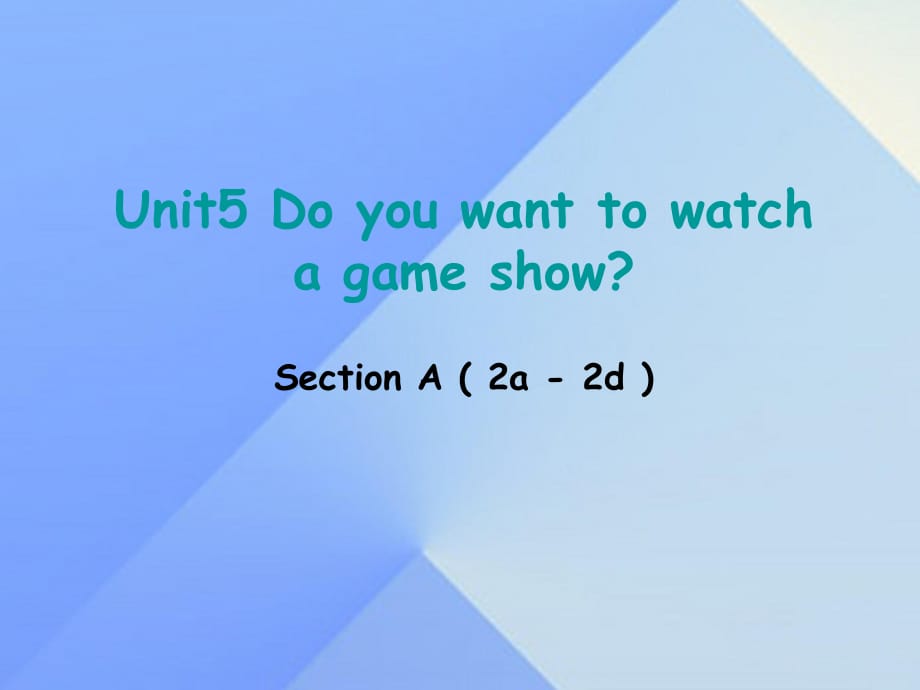《八年級英語上冊 Unit 5 Do you want to watch a game show section A(2a-2d)課件 (新版)人教新目標版》由會員分享��,可在線閱讀�����,更多相關(guān)《八年級英語上冊 Unit 5 Do you want to watch a game show section A(2a-2d)課件 (新版)人教新目標版(9頁珍藏版)》請在裝配圖網(wǎng)上搜索��。
1��、Unit5 Do you want to watch a game show?Section A ( 2a - 2d ) 2a. Listen to Lin Hui and Sallys conversation. Number the TV shows 1-5 in the order you hear._ sitcoms _ news_ game shows _ talk shows_ soap operas 2b. Listen again. Complete the conversation.54 231some great jokesnews or talk shows game s
2�、howssoap operas tonight PracticeAsk and answer questions about the TV shows in 2a. Use information that is true for you. Read and answerWhat did Sarah do in class today?Does G race like soap operas? Why? What does Sarah think of soap operas?Why does Sarah like news and talk shows best?She had a disc
3、ussion about TV shows.Yes. She likes to follow the story and see what happens next.She doesnt mind soap operas.Because she can expect to learn a lot from them. And she wants to be a reporter one day. Role-play the conversation 小結(jié)訓(xùn)練( )1. _ to him yesterday? A. What did happen B. Wahet did he happen C
4��、. What happened ( )2. The girl is not at school now. She _ at home. A. maybe B. mag is C. may be( )3. My sisiter is not good at English, I hope _. A. you to help her B. you help she C. to help her( )4. Can you learn _ from the man? A. a lot B. lots of C. a lot ofACCC 問題探究1. plan 的用法 1)制定一個計劃 make a
5、plan 2)我們計劃參觀長城�。We plan to visit the G reat Wall. plan 意為“計劃,打算”�。既可以作為動詞�,又可以作為名詞, 常用的句型為:plan to do sth. 計劃做某事�。2. hope 的用法 1)我希望你能很快好起來。I hope you can get well soon. 2)我希望能很快見到你�。 I hope to see you soon. hope 意為“希望”,經(jīng)常用到的句型為: hope to do sth. 希望做某事��; hope 后面還可以跟賓語從句�����,但不能接雙賓語�����。 問題探究3. expect 的用法 1)我期待著明天去
6�、北京。 I expect to go to Beijing tomorrow. 2)我期待你能和我一起去北京�����。 I expect you to go to Beijing with me. 3)我期待你能通過考試。 I expect that you can pass the test.expect 意為“期待��,盼望��,預(yù)期”��。 其句型為:expect to do sth. 期待做某事��; expect sb. to do sth. 期待某人做某事�; 此外 expect 后面還可以跟賓語從句。 問題探究4. happen 的用法 1)這個故事發(fā)生在2003年��。This story happened in 2003. 2)你怎么了�?What haasppened to you ? 3)昨天我在街上碰巧遇到了我的一個朋友。 I happened to meet a friend of mine in the street yesterday. 表示“某地(某時)發(fā)生了什么事”�����,常用 “happen in/at + 某地”這一結(jié)構(gòu)來表達��,這時主語應(yīng)該是事情��。 表示“某人出了某事(常指不好的事)”��,要用“ sth. + happen + to sb.”這一結(jié)構(gòu)來表達��。 表示“某人碰巧做某事”,要用“ sb. + happen + to do sth.”這一結(jié)構(gòu)來表達�。
 八年級英語上冊 Unit 5 Do you want to watch a game show section A(2a-2d)課件 (新版)人教新目標版
八年級英語上冊 Unit 5 Do you want to watch a game show section A(2a-2d)課件 (新版)人教新目標版

